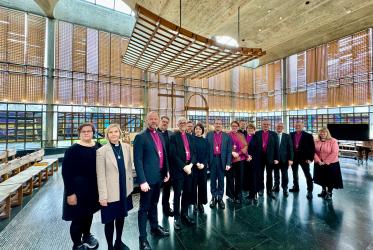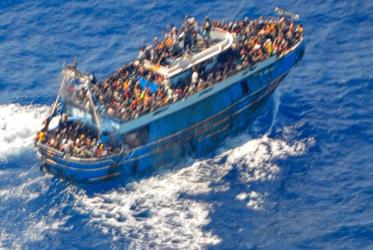* By Sophia Karekla
One hundred-and-twenty hierarchs and academic theologians, clergy, laity and young researchers, men and women from 25 universities and theological institutes and 15 countries participated as speakers at the 8th International Conference of Orthodox Theology in Thessaloniki on 21-24 May, organized by the Faculty of Theology of the Aristotle University of Thessaloniki (AUTH) under the auspices of the Ecumenical Patriarchate with the title: "The Holy and Great Council of the Orthodox Church: Orthodox Theology in the 21st Century.”
This conference, which is the 8th in a series since 1936, is the first to be held after the convening of the Holy and Great Council in June 2016 in Crete and for the first time in Thessaloniki, with the aim of discussing the decisions of the Council of Crete and submitting proposals for the agenda of the next Holy and Great Council.
The speakers, with their proposals in the plenary session and in parallel sessions, analyzed the mission of the Church in the modern world, the key theme of the Orthodox Diaspora, the future of theological studies, along with different pastoral, theological and historical parameters. In a plenary session, voices from other Christian traditions (Ancient Orthodox Eastern, Roman Catholic, Anglican, Lutheran) and the World Council of Churches (WCC) were also heard.
In his message, Ecumenical Patriarch Bartholomew I stressed that "the Holy and Great Council was not an introvert assembly, but it highlighted the openness of the Orthodox Church to its history, its affection for man and the infallible timeliness of the Gospel of Love."
Archbishop Anastasios of Albania declared that "the 21st century places new conditions, but also new possibilities for transferring the Christian message to new environments around the globe. It will be necessary to create the inter-Orthodox structures of the Orthodox witness throughout the world and to create competent ecclesiastical leadership with spiritual distinction and boldness combining theological study, missionary zeal and personal self-denial."
In the complex issue of the Orthodox Diaspora and its perspectives after the Holy and Great Council of Crete, Elder Archbishop Demetrios of America, spokesman for the Ecumenical Patriarch, referred to the normal problems that have arisen, such as "the existence of more than one bishop at the same place", while stressing the constructive role of local diocesan assemblies in pastoral affairs of charity and mission, which, however, has been recently overshadowed by the great flows of migrants and the creation of a new 1st generation Diaspora linked to metropolitan centers.
Metropolitan Prof. Dr Gennadios of Sassima, vice-moderator of the WCC Central Committee, stated: "The Holy and Great Council of the Orthodox Church has ended, getting much notice in the world at large, but conciliarity is just beginning. The Orthodox Church and the Ecumenical Patriarchate in particular was from its beginning a ‘Church of dialogue’, a Church which promoted and continues to promote dialogue, and it is fully engaged in theological conversations with love, truth and respect for the other. This was precisely the successful aspect of the Council, to be realistic and pragmatic as much as it was possible in the spirit of its teaching and doctrine for the search of the unity of the Church.”
The chairman of the Congress Organizing Committee, Prof. Miltiadis Konstantinou, dean of the Faculty of Theology of AUTH, underlined that: "The international academic theological community responded to its duty to assist in the work of the Church with theological thought and research, delving into the decisions of the Council and by submitting concrete proposals for the future of the council institution...two years after the meeting of the Council, the conference confirmed, among other things, the unity of Orthodoxy as it was attended by academics, clergy and laymen coming from Churches that did not attend the Council.”
Metropolitan Prousis Elpidophoros, member of the Central Committee of the WCC, pointed out that the international conference is contributing to the dissemination of the messages of the Holy and Great Council. With regard to the next Council, whenever it is convened, he argued that "we must reevaluate the term ‘heretic’, distinguishing it from the heterodox Christian or the homodox schismatic, which will help us to better understand the letter and the spirit of sacred rules and the practice of the Church".
"The Orthodox academic theological community, two years after the Holy and Great Council, took responsibility for the first collective adoption of its decisions and discussed the next steps for a forthcoming one in the near future," stated professor of the Faculty of Theology, member of the Central Committee of the WCC and conference coordinator Dimitra Koukoura. She also stressed the importance of opening up the Orthodox Church to the modern world, including "the duty of the Gospel's testimony, the dialogue with other Christian traditions, the struggle against multiform injustice and the creative coexistence with all peoples."
Rev. Fr Frans Bouwen, of the Roman Catholic Church and a former member of the Commission on Faith and Order of the WCC, in his lecture mentioned "as a renewed manifestation of the unity and synodality of the Orthodox Church, the Council concerns the entire Christian world and is a significant moment in the search for Christian unity, in particular between the Roman Catholic and the Orthodox Churches."
The previous relative international conferences (Athens 1936 and 1976, Boston 1987, Bucharest 1992, Belgrade 2001, Sofia 2004, Jönensu 2006) had two different characteristics. They were congresses of Orthodox Faculties of Theology and had as their work subjects the issues to be discussed at the Holy and Great Council. At the 8th International Congress, the theological academic community elaborated further the texts referring to the lives of believers in the modern world, the achievements, the problems, the threats and the potential of the second decade of the 21st century.
The article is written by Sophia Karekla, Journalist/Editor in chief Orthodoxia.Info
Theological Conference in Greece Unpacks the Teaching of the 2016 Orthodox Council
Site of the 8th International Conference of Orthodox Theology






